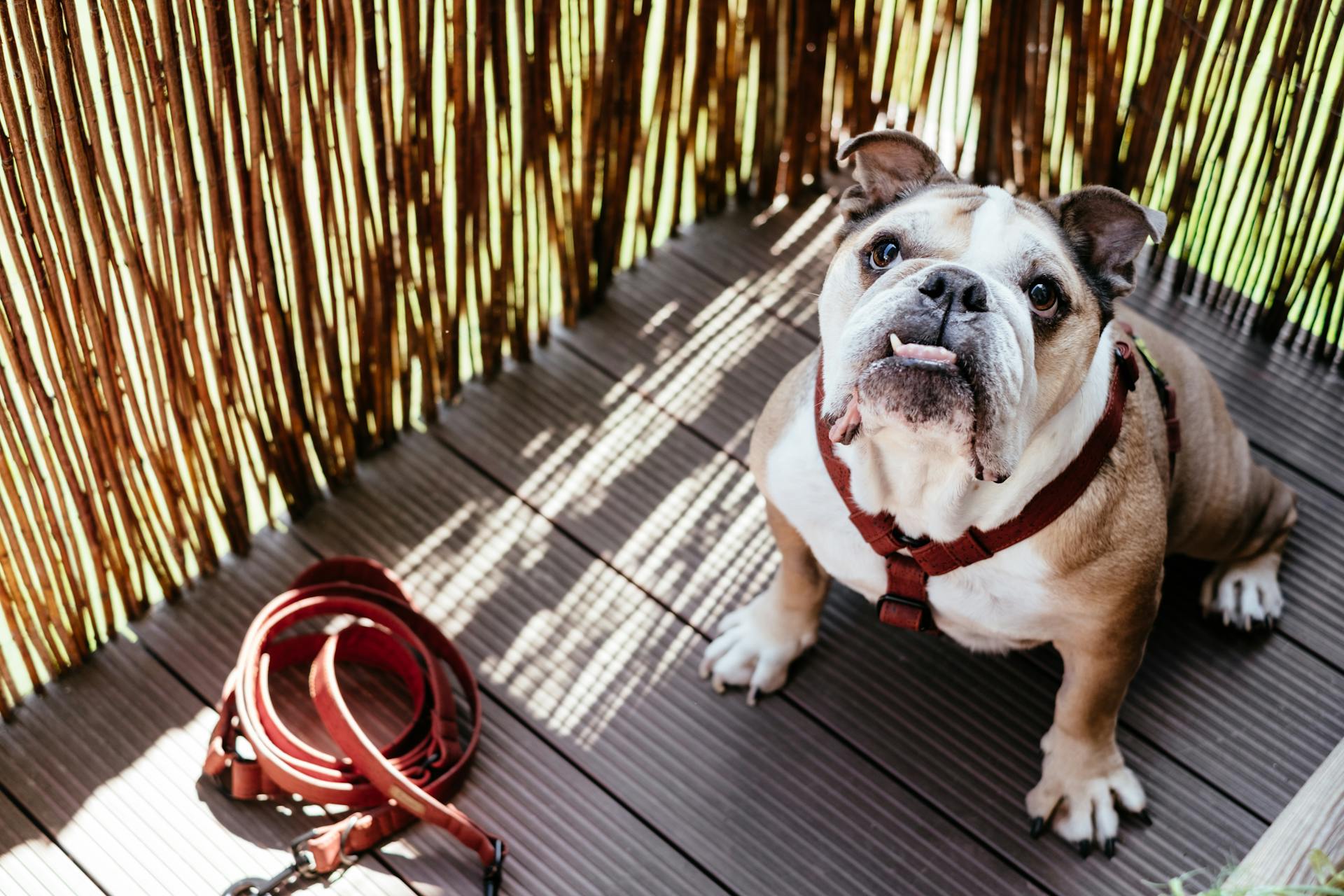
English Bulldogs are known for their gentle and affectionate nature, but they can be stubborn at times.
They require regular exercise, but it's essential to keep it short and sweet due to their brachycephalic (short-nosed) skull structure.
In fact, English Bulldogs can tire easily and may even experience breathing difficulties, so it's crucial to monitor their activity levels.
English Bulldogs have a short, easy-to-maintain coat, but they do require regular grooming to prevent skin fold infections and other issues.
For your interest: Healthy Mind Canine - Separation Anxiety Training
English Bulldog Basics
English Bulldogs are not a breed known for their intelligence, so you can expect them to only pick up basic obedience commands. They may not learn a lot of tricks.
Training your English Bulldog will take patience, as they're known for their stubborn streak. You may need to ask a few times before they respond. Their preferred training sessions are fun, but kept short, with plenty of positive reinforcement.
Here are some key facts to keep in mind:
- English Bulldogs need around 30 minutes of exercise per day, split into two 15-minute sessions to prevent overexertion.
- They're not natural swimmers, so keep them away from water.
- They love a good game of tug-of-war with a dog-safe rope toy, which doesn't require too much running around.
Temperament & Personality
English Bulldogs are known to be a bit stubborn, often pausing before responding to commands to see what's in it for them. They're a wilful breed, but with patience and consistency, they'll learn to listen.
Despite their stubbornness, English Bulldogs are friendly, gentle, and sociable, making them excellent companions and family pets. They love to relax and adapt well to apartment living and smaller spaces.
To keep your English Bulldog happy and healthy, make sure to give them enough exercise to avoid weight gain. They're couch potatoes at heart, but they need regular physical activity to stay in shape.
Here are some key characteristics of English Bulldog temperament and personality:
- Wilful and stubborn, but with patience and consistency, they'll learn to listen
- Friendly, gentle, and sociable, making them excellent companions and family pets
- Adapt well to apartment living and smaller spaces, but need regular exercise to avoid weight gain
Dog Basics
English Bulldogs are known for their gentle and affectionate nature, but they still require proper training to become well-behaved companions.
Start a dog obedience program to establish consistent protocols for you and your English Bulldog to follow. This will make training sessions more effective and enjoyable for both of you.
Using positive reinforcement is a great way to train your English Bulldog. Reward good behavior with treats, toys, or praise, and ignore bad behavior. This technique is effective for basic training and even for teaching advanced tricks.
English Bulldogs are intelligent dogs and need mental stimulation. Teach them basic commands like "come", "stay", and "drop it" to give them structure and help you overcome common behavior problems.
Training sessions should be short and fun to prevent frustration. Keep your tone light and be fair to your English Bulldog. If you're both enjoying yourselves, training sessions will be more effective.
Here are some basic dog training commands and fun tricks that every English Bulldog should know:
- come
- stay
- drop it
- back up
- speaking
Remember, training is key to making your English Bulldog more confident and comfortable in various situations.
Training and Socialization
Socialization is key to raising a well-adjusted English Bulldog. Socialization means exposing your puppy or adult dog to new people, animals, and places, which can help prevent behavior problems and fears.
You can start socializing your Bulldog as soon as they come home, usually around 8 weeks old. Puppies can begin very simple training starting as soon as they come home, and they should be able to play nicely with other dogs by 6 months.
A well-behaved dog is a joy to live with, and proper training helps ensure that your pup can participate in almost everything you do together. Proper socialization involves quality interactions, not a lot of random ones, so curate your puppy's friend list to make sure they are only interacting with other dogs that will behave appropriately towards them.
Here are some AKC dog training programs that can help with socialization and training:
- AKC S.T.A.R. Puppy
- Canine Good Citizen (CGC)
- AKC Community Canine (CGCA)
- AKC Urban Canine Good Citizen (CGCU)
Get Your Involved
Socialization is key to raising a confident and well-behaved Bulldog. Proper socialization involves exposing your puppy to new people, animals, and places, making them less likely to develop behavior problems.
To start, you can enroll your Bulldog in the AKC S.T.A.R. Puppy program, which teaches manners and socialization to other dogs. This program is a great way to get your puppy used to meeting new canines and people.
For your interest: Brindle English Bulldog Puppy
By 6 months, your Bulldog puppy should be able to play nicely with other dogs and be ready to continue basic obedience lessons. At this stage, you can also consider incorporating training classes into your Bulldog's exercise routine.
Bulldogs are very smart, and AKC Canine Good Citizen classes teach them the basics. These classes are a great way to mentally stimulate your dog and tire them out.
Here are some AKC activities that your Bulldog can participate in:
- AKC Canine Good Citizen (CGC)
- AKC Community Canine (CGCA)
- AKC Urban Canine Good Citizen (CGCU)
- AKC Trick Dog
- AKC Therapy Dog
- AKC FIT Dog
- AKC Virtual Home Manners (VHM)
Remember, getting your Bulldog involved in activities and training classes is a great way to strengthen your bond and create a happy and well-behaved companion.
Proofing and Troubleshooting
Proofing and Troubleshooting is a crucial part of the training process. You've got to practice, practice, practice, to help your dog generalize their new behaviors.
Practice behaviors in a variety of places with different levels of distraction. This will help your dog learn to behave well even when they're not in their usual environment.
Recognizing common dog behavior problems is key to addressing them before they get out of control. Understanding potential issues can help you detect and address them.
Some common dog behavior problems include forgetting training when they're outside the house. This is where proofing comes in – it's the last step in training your dog to do any new behavior.
Here are some tips to keep in mind:
- Practice behaviors in different locations and with varying levels of distraction.
- Recognize common dog behavior problems and be prepared to address them.
Nutrition and Health
English Bulldogs are prone to obesity due to their love of food and laziness, so it's crucial to find the right diet for your pet.
Their naturally thickset physique and loose-fitting skin can mask signs of obesity, making regular check-ins with your vet a must to ensure your English Bulldog is a healthy weight. English Bulldogs can be greedy eaters, so portion control is key.Feed your pet a high-quality food and always follow the portion guidelines on the packaging.
Exercise is also important to keep your English Bulldog a healthy weight, but it's essential to avoid overexertion. Remember, English Bulldogs are slow to mature compared to other breeds, and may not reach adulthood until between 18 to 24 months, so be patient and consult your vet if you're unsure about transitioning from puppy food to adult food.
Intriguing read: How Much Food Should a 50 Lb English Bulldog Eat
Nutrition

English Bulldogs have a unique nutritional need due to their signature laziness and love of food, which can lead to obesity if not managed properly. This is why it's essential to find the right diet for your pet.
Their naturally thickset physique and loose-fitting skin can mask signs of obesity, so regular check-ins with your vet are crucial to ensure your English Bulldog is at a healthy weight. Obesity is a common health problem in English Bulldogs.
Exercise is also important for English Bulldogs, but it's essential not to overexert them. A moderate amount of exercise can help keep your dog at a healthy weight.
English Bulldogs can be greedy eaters, so portion control is key. Feed your pet a high-quality food and always follow the portion guidelines on the packaging.
Here are some tips for feeding your English Bulldog:
- Feed your pet a high-quality food.
- Always follow the portion guidelines on the packaging.
- Go easy on the snacks and treats when using food as a motivator.
Remember, English Bulldogs are slow to mature compared to other breeds, and may not reach adulthood until between 18 to 24 months. This is important to bear in mind when moving from puppy food to adult food.
You might like: Best Food for Olde English Bulldog
Grooming Essentials
Gently wipe your bulldog's wrinkles down daily with paper towels or soft tissues to keep them dry and get the pup used to being handled.
It's essential to make grooming sessions a game to help your dog feel comfortable with handling and cleaning. Smear peanut butter or canned pumpkin on a lick mat, chew toy, or even the front of your refrigerator to get your dog interested.
Start by letting your dog engage with the treat before handling them and wiping down their wrinkles. This will help them associate grooming with positive experiences.
Use this game for simple petting and brushing before trying to clean their faces and paws. This will help your dog become comfortable with handling and cleaning.
Remember, wrinkles can house bacteria and yeast if not cleaned several times per week with peroxide and dried with cornstarch.
Take a look at this: Grooming an English Bulldog
Exercise and Safety
Exercise your Bulldog in cool temperatures, ideally early in the morning or late in the evening, to avoid the extreme heat of mid-day.
Always bring ample water for your dog, and consider outfitting your pup with a cooling jacket on warmer days to keep them cool.
If your dog is panting a lot, it's time to take a break and get your dog cooled down with some room-temperature water.
Here's an interesting read: Water Dog Training
Exercise in Cool Temperatures
Exercise in cool temperatures is crucial for Bulldogs, especially since they're a brachycephalic breed. Their short muzzles make breathing difficult on hot, humid days.
Exercise your Bulldog very early in the morning or late in the evening to avoid the extreme heat of mid-day. It's essential to bring ample water for your dog, as recommended by Daigle.
If your dog is panting a lot, it's time to take a break and get your dog cooled down with some room-temperature water. You can also outfit your pup with a cooling jacket on warmer days to keep their temperature within the normal range.
Exercising your pup inside with the air conditioner on is always an option when it's hot outside. You can even create an indoor playroom for your pup to stay cool and active.
Discover more: English Bulldog Exercise
Water Safety
Water Safety is crucial for Bulldogs, especially when it comes to swimming. Bulldogs are poor swimmers due to their body structure.
Explore further: Training French Bulldogs
Shallow kiddie pools can be a fun activity for your Bulldog, as long as you're around to supervise. Always be safe and outfit your Bulldog with a life jacket when around lakes or oceans.
Remember, it's always better to err on the side of caution when it comes to your Bulldog's water activities.
Frequently Asked Questions
Are English bulldogs easy to crate train?
English bulldogs are naturally inclined to crate training due to their den and pack animal instincts, making it a suitable and effective method for housebreaking. Crate training can help establish a sense of security and routine for your bulldog puppy.
Sources
- https://www.petplan.co.uk/pet-information/dog/breed/bulldog/
- https://www.thesprucepets.com/steps-to-train-your-dog-1118273
- https://www.akc.org/products-services/training-programs/
- https://www.doggoneproblems.com/ope-bucket-game/
- https://www.akc.org/expert-advice/dog-breeds/bulldog-puppy-training-timeline-what-to-expect-and-when-to-expect-it/
Featured Images: pexels.com


